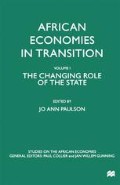Abstract
Until quite recently almost all African countries operated fixed exchange rate regimes, either unilaterally or as members of the Franc Zone. Economic reform, particularly in formerly socialist countries such as Ethiopia, has usually led to abandonment of fixed exchange rate systems, often under pressure from donors. It is, obviously, not inevitable that liberalisation should involve the giving up of the fixed exchange rate policy, but there are several reasons for focusing on this case. First, in most African countries the fixed exchange rate regime was in many ways the centrepiece of the control regime: it was the decision to maintain an overvalued exchange rate that made the adoption of other controls (foreign exchange rationing, import licensing and, in many countries, price controls) almost inevitable. In view of the prominent position of the exchange rate regime, it would be extraordinarily difficult for a government to achieve credibility for its liberalisation programme if it were to maintain a fixed exchange rate. For example, at present the Zimbabwean liberalisation programme is not fully credible precisely because the Central Bank has recently (February 7) made it clear that it intends to maintain something like a fixed exchange rate regime.
Access this chapter
Tax calculation will be finalised at checkout
Purchases are for personal use only
Preview
Unable to display preview. Download preview PDF.
References
Adam C.S., B. Ndulu and N.K. Sowa (1996) ‘Liberalization and Seigniorage Revenue in Kenya, Ghana and Tanzania’, Journal of Development Studies, 32 (4): 531–553.
Azam, J.-P. (1990), ‘The Groundnuts and Phosphates Boom in Senegal (1974–1977)’, mimeo, CERDI, Universite d’Auvergne.
Bevan, D.L., P. Collier and J.W. Gunning (1987) ‘Consequences of a Commodity Boom in a Controlled Economy: Accumulation and Redistribution in Kenya, 1975–1983’, World Bank Economic Review, 1: 489–513.
Bevan, D.L., P. Collier and J.W. Gunning (1989) ‘Fiscal Response to a Temporary Trade Shock: the Aftermath of the Kenyan Coffee Boom’, World Bank Economic Review, 3: 359–78.
Bevan, D.L., P. Collier and J.W. Gunning (1989a) Peasants and Governments: an Economic Analysis, Oxford: Oxford University Press (Clarendon Press).
Bevan, D.L., P. Collier and J.W. Gunning (1990) Controlled Open Economies: a Neoclassical Approach to Structuralism, Oxford: Oxford University Press (Clarendon Press).
Bevan, D.L., P. Collier and J.W. Gunning (1993) Nigeria: Policy Responses to Shocks, 1970–1990, San Francisco: ICS Press, for the International Center for Economic Growth.
Bevan, D.L., P. Collier and J.W. Gunning (1993a) ‘La politique économique face aux chocs externes dans les pays en developpement’, Revue d’économie du developpement, 1: 5–22.
Bevan, D.L., P. Collier and J.W. Gunning (1993b) ‘Trade Shocks in Developing Countries: Consequences and Policy Responses’, European Economic Review, 37: 557–65.
Calvo, G.A. (1987) ‘On the Costs of Temporary Policy’, Journal of Development Economics, 27: 245–61.
Collier, P. and J.W. Gunning (1992) ‘Aid and Exchange Rate Adjustment in African Trade Liberalisations’, Economic Journal, 102: 925–39.
Collier, P. and J.W. Gunning (1991) ‘Financial Liberalisation in a Socialist Banking System’, World Development.
Collier, P. and J.W. Gunning (1993) ‘Trade and Development: Protection, Shocks and Liberalisation’, in D. Greenaway and L.A. Winters (eds) Surveys in International Trade, London: Macmillan.
Collier P. (1991) ‘Africa’s External Economic Relations, 1960–90’, African Affairs.
Collier P. (1992) ‘EMU and 1992: Opportunities for Africa’, The World Economy.
Collier P. (1993) ‘The Simple Analytics of an Oil Fund’, mimeo, Oxford: CSAE.
Gelb, A. and associates (1988), Oil Windfalls: Blessing or Curse?, New York: Oxford University Press.
Hill, C.B. (1991) ‘Managing Commodity Booms in Botswana’, mimeo, Williams College.
Osei K.A. (1993) ‘Foreign Exchange Bureaux in the Economy of Ghana’, Nairobi: AERC.
Roberts, J. (1989) ‘Liberalising Foreign-Exchange Rates in Sub-Saharan Africa’, Development Policy Review, 7: 115–42.
World Bank (1990) ‘Republic of Guinea Country Economic Memorandum’, Report No. 877-GUI, 2 vols.
Wulf, J. (1989) ‘Floating Exchange Rates in Developing Countries: the Case of Zambia’, Journal of Modern African Studies, 27: 503–19.
Editor information
Editors and Affiliations
Copyright information
© 1999 Centre for the Study of African Economies
About this chapter
Cite this chapter
Collier, P., Gunning, J.W. (1999). Exchange Rate Management in Liberalising African Economies. In: Paulson, J.A. (eds) African Economies in Transition. Studies on the African Economies. Palgrave Macmillan, London. https://doi.org/10.1007/978-1-349-27480-2_5
Download citation
DOI: https://doi.org/10.1007/978-1-349-27480-2_5
Publisher Name: Palgrave Macmillan, London
Print ISBN: 978-1-349-27482-6
Online ISBN: 978-1-349-27480-2
eBook Packages: Palgrave Economics & Finance CollectionEconomics and Finance (R0)

